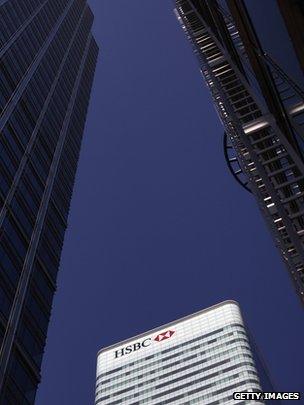Who pays for banks’ sins?
- Published
- comments

The price in today's money of past sinning by the UK's biggest international banks is becoming bigger and bigger.
HSBC is paying $1.9bn (£1.2bn) in fines and forfeitures to assorted federal and state authorities for its inadequate controls against money transfers by criminals, terrorists and countries that are subject to sanctions (such as Iran).
In a statement, HSBC apologised and said it had changed its ways. It expects to reach a settlement soon with the UK's Financial Services Authorities relating to the same offences.
The $1.9bn is significantly more than the penalties HSBC expected to pay - even after its recent upward revision of provisions to cover such charges. Also the cost for HSBC of raising its defences against money laundering and illegal money movements will be $700m (£435m) over five years.
Odd as it may seem, it could however have been significantly worse. HSBC has signed a Deferred Prosecution Agreement for breaches of the US Bank Secrecy Act, the Trading with the Enemy Act and assorted money laundering offences. This is in effect putting the bank on probation.
But if HSBC had been indicted for these offences, that would have meant that the US government and others could no longer have conducted business with it - which would have been humiliating and highly damaging.
The punishment of HSBC comes just a day after another UK based international bank, Standard Chartered, agreed to pay $327m (£203m) for past violations of US sanctions laws and "lack of transparency in connection with certain former payments practices which were terminated in 2007".
Standard Chartered, which also signed a deferred prosecution agreement, had already paid $340m to New York State's Department of Financial Services for the same offences.
Now, for the avoidance of doubt, there is a trend here - which is that every big British bank is struggling to keep control of the costs of fines and compensation relating to a great variety of forms of sloppy practices and misbehaviour in the boom years.
Robert Peston: Bank fines astonishingly high
It won't be long before we begin to learn the fines that Royal Bank of Scotland will pay to regulators all over the world for its involvement in the LIBOR interest-rate rigging scandal.
RBS is likely to end up paying more than the £290m in fines and penalties paid by Barclays - though that may not be apparent for a while, since RBS is not expected to reach a big bang settlement with all authorities from Tokyo to Brussels to Washington at the same time.
Then there are the stupendous costs of paying compensation to UK retail customers who were missold PPI credit insurance - which, according to the FSA, was more than £7bn by the end of September and looks set to end up being considerably more than £10bn.
And then there are the difficult-to-pin-down costs of compensating small businesses who were sold inappropriate interest-rate swaps - which will certainly be rather more than £1bn in aggregate and possibly (in an unlikely worst case for the banks) a multiple of that.
In addition, most of the banks face civil cases from disgruntled investors related to these and other alleged failings that stem from the exuberance of the boom years.
All of which is of material interest to the banks' customers and shareholders.
The point, as the Governor of the Bank of England said recently, is that banks may not have adequate capital to absorb the full financial cost of all the punishment being meted out for banks' past sins.
And as you will be tired of hearing, capital is expensive. And when banks are obliged to raise more of it, the burden falls initially on investors and subsequently on customers - who are forced to pay more for banking services to reward the providers of the capital.
Or to put it another way, we are all punished when banks are found guilty.